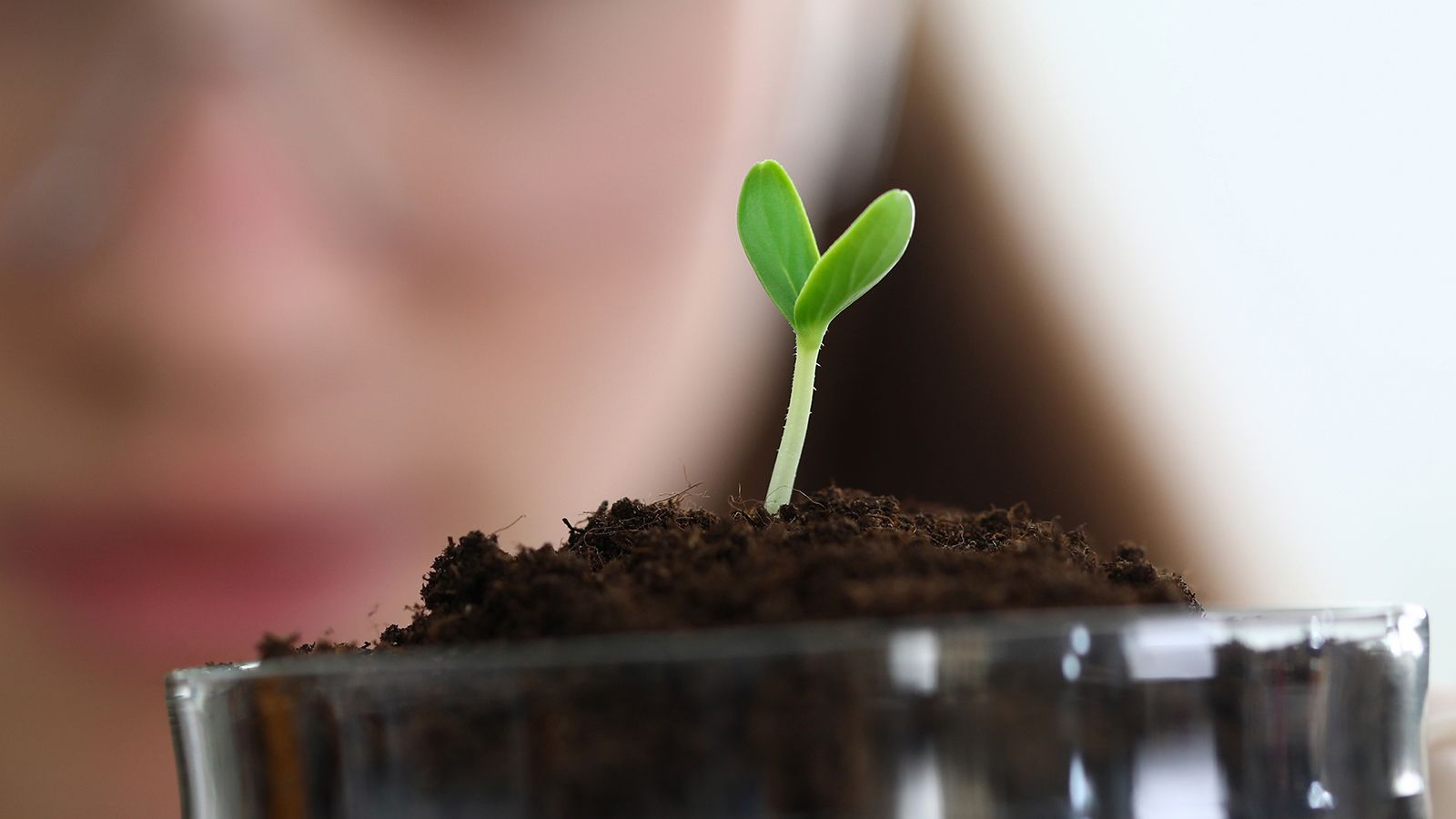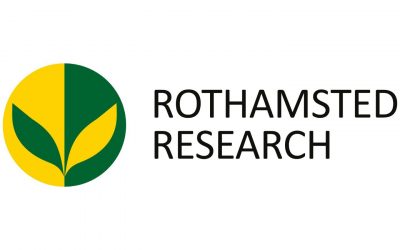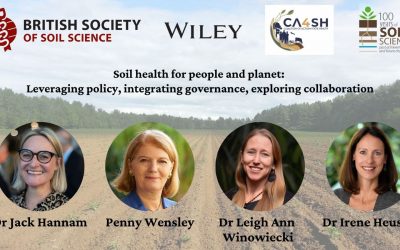The British Society of Soil Science’s (BSSS) virtual Annual Conference, sponsored by Arcadis, will take place on Tuesday 7 September 2021 and will consider soil health from five different perspectives, providing insight into a prominent topic across professional and academic practice.
Soil Health: From Principles to Practice will welcome presentations from Jim Harris on A New Look at Soil Health, Elizabeth Stockdale, Head of Farming Systems and Agronomy Research at NIAB, looking at soil health scorecards for farmers, Matthias Rillig on how multiple factors of global change affect soil processes and biodiversity and Felicity Crotty discussing using soil biology to assess soil health. Each speaker will present their perspective of soil health and then engage in a panel discussion with questions from our delegates.
BSSS is delighted to also welcome Dr Rattan Lal who will give the President’s Lecture titled Returning Land to Nature by Producing Just Enough from Less. A renowned soil scientist, Dr. Lal was awarded the 2019 Japan Prize for ‘the sustainable soil management for global food security and mitigation of climate change’ and was named the recipient of the prestigious World Food Prize in 2020. In his presentation, Dr Lal will explain how degradation of one-third of agricultural soils has increased yield gap and that 30-50% of food produced is wasted, 700 million people are under-nourished and 2 billion are malnourished. He will discuss how food production and consumption systems must be designed to protect, restore, manage, and return some land to nature and that the strategy is to restore soil health, improve soil organic matter, reduce food waste, adopt prudent consumption systems, produce just enough of nutrition-sensitive food, and return some land to nature.
Professor Sacha Mooney, BSSS Past President and Conference Chair said, “Soil Health is a very prominent topic of conversation at the moment with many different views, perspectives and ideas on what determines healthy soil and how this can be achieved and assessed in practice. I hope that our programme highlights the importance of soil health, suggests some important next steps and raises an awareness of what we can all do to make a difference.”
The conference will take place from 9:00am – 12:15pm, is free of charge to BSSS members and registration is available via: https://attendee.gotowebinar.com/register/1739408019461939980.
The virtual event will be followed by the Society’s Annual General Meeting at 12:15pm.
Download the programme and speaker biographies for our Annual Conference.
Media Contact
Sarah Garry
Executive Officer
British Society of Soil Science
Email: exec@soils.org.uk
Notes for Editors
- The British Society of Soil Science (BSSS) is an established international membership organisation and charity committed to the study of soil in its widest aspects. The society brings together those working within academia, and practitioners implementing soil science in industry. Soil scientists’ research findings are essential for investigating the feasibility of agricultural, landscaping, construction, conservation and archaeological projects. Our members are employed by both private and public sector institutions including academic universities, conservation charities, construction companies and consultancies.
- Participants can register for the Annual Conference via the Go To Webinar link: https://attendee.gotowebinar.com/register/1739408019461939980
- The BSSS Annual Conference is open to members only and you can join from as little as £31 per year, visit soils.org/membership.
- Professor Jim Harris is a systems ecologist principally working in soil microbiology, restoration ecology and ecosystem service research focused on microbial ecology in relation to ecosystem processes. He has applied this particularly in the assessment and treatment of degraded systems, restoration ecology, quantitative assessment of ecosystem goods and services, and has pioneered work on catabolic profiling and the thermodynamics of soil microbial communities. This work has advanced our understanding of the effects of environmental and management practices on the soil microbial community, provided better tools for assessing ecosystem status, the effects of land management and importantly restoration programmes aimed at enhancing natural capital to achieve net environmental gain.
- Elizabeth Stockdale is the Head of Farming Systems and Agronomy Research at NIAB and has over 25 years’ experience of research and knowledge exchange in soil management, nutrient cycling and environment impact. She currently leads the AHDB-BBRO funded Soil Biology and Soil Health Partnership which is developing practical on-farm tools for monitoring.
- Professor Dr. Matthias C. Rillig is a Professor of Ecology at Freie Universität Berlin, and director of the Berlin-Brandenburg Institute of Advanced Biodiversity Research. Matthias studied his undergraduate degrees at the Universität Kaiserslautern, Germany, and the University of Edinburgh. He went on to complete a PhD in Ecology at the University of California Davis/ San Diego State University followed by a postdoc at the Carnegie Institution of Washington, Department of Plant Biology, Stanford. Matthias’ interests are in soil biodiversity, especially fungi, and the effects of drivers of global change on soils.
- Dr Felicity Crotty has been researching soil biology and soil health for the last twelve years. Felicity joined the Royal Agricultural University as a Lecturer in Soil Science and Ecology in 2018. She is a soil ecologist working with the aim of promoting soil health and sustainable agriculture and is particularly interested in investigating how agricultural management affects soil quality, focusing on soil biology (earthworms, springtails, mites and nematodes), physics (compaction and water infiltration) and chemistry (N, P, K and other nutrients). Through combining her expertise in all three areas of soil science she is trying to disentangle the real impact different management strategies have on soil health and farming sustainably. Felicity has current projects investigating the use of AI to identify earthworm casts, linking soil biology to agricultural management and monetising soil health.
- Rattan Lal, Ph.D., is a Distinguished University Professor of Soil Science and Director of the CFAES Dr. Rattan Lal Carbon Management and Sequestration Center at The Ohio State University, as well as an Adjunct Professor of University of Iceland and the Indian Agricultural Research Institute (IARI), India. He received a B.S. from Punjab Agricultural University, Ludhiana, India (1963); M.S. from Indian Agricultural Research Institute, New Delhi, India (1965); and Ph.D. from the Ohio State University, Columbus, Ohio (1968). He served as Sr. Research Fellow with the University of Sydney, Australia (1968-69), Soil Physicist at IITA, Ibadan, Nigeria (1970-87), and Professor of Soil Science at OSU (1987 to date). Dr. Lal is laureate of the GCHERA World Agriculture Prize (2018), Glinka World Soil Prize (2018), Japan Prize (2019), U.S. Awasthi IFFCO Prize of India (2019), Arrell Global Food Innovation Award of Canada (2020), World Food Prize (2020), and Padma Shri Award (2021) of the Government of India.




